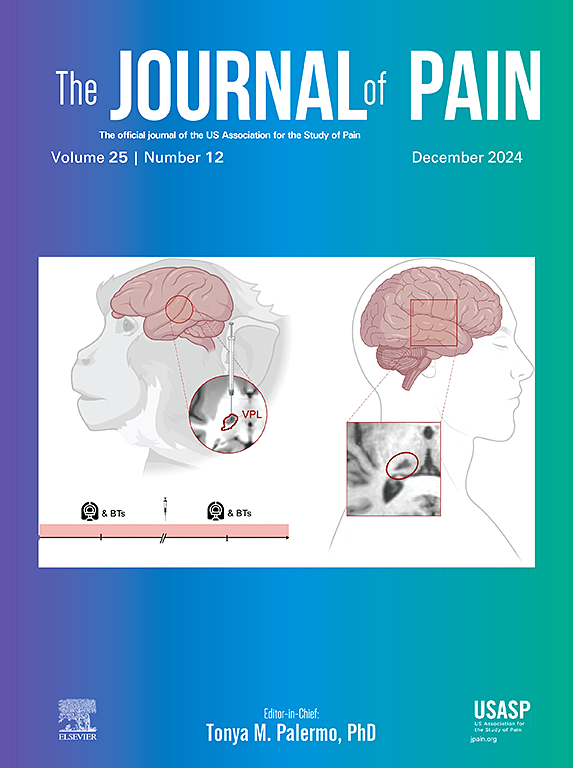Relationships Between Applied Mindfulness Practice, Chronic Pain, and Pain-Related Functioning in Veterans
IF 4
2区 医学
Q1 CLINICAL NEUROLOGY
引用次数: 0
Abstract
Mindfulness-based interventions (MBIs) have been shown to improve chronic pain and associated conditions like depression, anxiety, and sleep disorders. However, there is limited research on how veterans with chronic pain apply mindfulness skills to manage pain in daily life. This cross-sectional study examined the association between applied mindfulness practice, pain, and several pain-related conditions among 1,737 veterans with chronic pain prior to enrollment in a trial of 2 MBIs. Applied mindfulness practice was assessed using the Applied Mindfulness Process Scale (AMPS). The outcomes included pain interference, pain intensity, pain catastrophizing, fatigue, sleep disturbance, anxiety, depression, post-traumatic stress disorder, physical function, and social participation. Higher overall AMPS scores, as well as the positive and negative emotional regulation subscales of the AMPS, were associated with less pain interference and catastrophizing, as well as better outcomes for all pain-related conditions. The positive emotional regulation subscale had the strongest associations with outcomes. There was no significant association between the AMPS and pain intensity. The results suggest applied mindfulness practice, especially positive emotional regulation, may improve pain and functioning. In addition, the AMPS shows promise as a process measure of mindfulness skills applied in daily life. Additional research is needed to examine different aspects of mindfulness in the context of MBIs.
Perspective
This article describes the relationship between applied mindfulness practice and pain-related outcomes, prior to a MBI, using a novel measure of mindfulness practice. These findings underscore the importance of measuring applied mindfulness practice prior to and during clinical interventions to treat chronic pain.
退伍军人的应用正念练习、慢性疼痛和与疼痛相关的功能之间的关系。
以正念为基础的干预(MBIs)已被证明可以改善慢性疼痛及相关症状,如抑郁、焦虑和睡眠障碍。然而,关于患有慢性疼痛的退伍军人如何在日常生活中运用正念技能来控制疼痛的研究却很有限。这项横断面研究考察了 1737 名患有慢性疼痛的退伍军人在参加两种 MBIs 试验之前应用正念练习、疼痛和几种疼痛相关病症之间的关联。应用正念练习采用应用正念过程量表(AMPS)进行评估。结果包括疼痛干扰、疼痛强度、疼痛灾难化、疲劳、睡眠障碍、焦虑、抑郁、创伤后应激障碍、身体功能和社会参与。较高的 AMPS 总分以及 AMPS 的积极和消极情绪调节分量表与较低的疼痛干扰和灾难化程度以及所有疼痛相关症状的较好疗效有关。积极情绪调节分量表与疗效的关系最为密切。AMPS 与疼痛强度之间没有明显的关联。研究结果表明,应用正念练习,尤其是积极情绪调节,可以改善疼痛和功能。此外,AMPS 作为日常生活中应用正念技能的过程测量方法也很有前景。还需要进行更多的研究,以检查正念在 MBIs 中的不同方面。观点:这篇文章描述了在基于正念的干预之前,使用一种新的正念练习测量方法,应用正念练习与疼痛相关结果之间的关系。这些发现强调了在治疗慢性疼痛的临床干预之前和干预过程中测量应用正念练习的重要性。
本文章由计算机程序翻译,如有差异,请以英文原文为准。
求助全文
约1分钟内获得全文
求助全文
来源期刊

Journal of Pain
医学-临床神经学
CiteScore
6.30
自引率
7.50%
发文量
441
审稿时长
42 days
期刊介绍:
The Journal of Pain publishes original articles related to all aspects of pain, including clinical and basic research, patient care, education, and health policy. Articles selected for publication in the Journal are most commonly reports of original clinical research or reports of original basic research. In addition, invited critical reviews, including meta analyses of drugs for pain management, invited commentaries on reviews, and exceptional case studies are published in the Journal. The mission of the Journal is to improve the care of patients in pain by providing a forum for clinical researchers, basic scientists, clinicians, and other health professionals to publish original research.
 求助内容:
求助内容: 应助结果提醒方式:
应助结果提醒方式:


